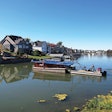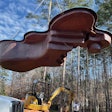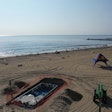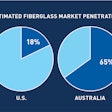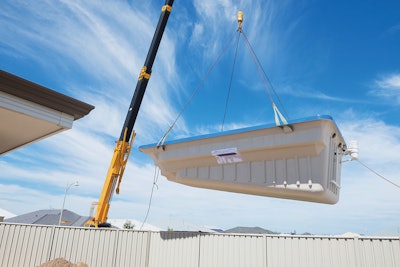
Recently, America's Swimming Pool Company (ASP) announced that it will become a fiberglass pool builder as well as a pool service provider. (The company was one of the original service franchisors, and built a large and growing network of pool maintenance companies, with locations from Michigan to New Mexico, and coast to coast.)
As anyone in the pool construction business can attest, starting up as a builder is a big job all by itself, but why fiberglass? For the same reasons fiberglass is expanding each year in terms of market share, with dealers adding the pool to their portfolio of options. It's a swift and efficient and systematic build — well suited for the business model of a franchise.
"If somebody was asking me for advice on where to start if I wanted to ease into pool building, I would definitely say fiberglass," says John Hutchinson, a veteran builder who owns ASP of Nashville. "It can be the fastest way to build a pool."
As Hutchinson points out, with fiberglass, support of the pool shell is the key. Once you get that down, the build can proceed at a brisk pace.
There's a couple of things that you've really got to hone in on: the grade, the compaction and the backfill around the pool. The good thing with fiberglass is there's not as many parts. There's just not as many things that could possibly go wrong, and it's usually a quicker install — so less time, less risk.
"But the beauty of fiberglass is if you have everything right underneath the pool, you go from no pool to a pool in one day."
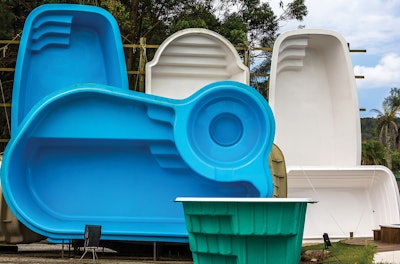
GROWTH BEGETS GROWTH
The move to construction for a service franchisor is a big one, and the reason is simple: growth. In the history of the pool and spa industry, different periods have seen sector expansion, but especially since the boom, construction has been on a tear.
That level of growth varies over time and by region of the country, says Shaun Hurley, ASP's director of renovation and construction. "Some locations are up over the last year, some are flat and some are right there in between. They're still growing, but they're not growing as fast as we've seen in the past couple years. Looking back on the Covid growth numbers, they were 18, 20% growth for that two-year time period really.
"I would say we're on track for 10 to 12% right now, which is good when you look at the large growth that took place during Covid." Growth was more shallow from 2018 to 2020, then steeper with the surge, he adds, but if you were to draw a straight line from 2018, it would be about a 15% slope.
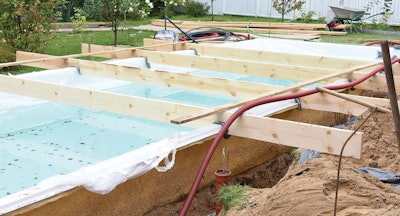
NEW HOMES, NEW POOLS
New housing starts, driven by a blistering market for residential housing, has helped fuel the expansion. Hutchinson works with local builders in his Nashville area to add pools to houses going up in the suburbs.
He's seen a real shift in attitudes — very much for the better — over the last few years.
"Pre-Covid, there were a lot of speculative home builders that would say to us something like, 'Hey, if we close and the guy wants a pool, we'll recommend you.' But they're like, 'We're definitely not spending the money in our spec home budget to build a pool. You take care of that afterwards.'
"Whereas now, a large portion of the pools we're doing are for spec homes, and we've heard from appraisers and real estate agents alike, saying, 'People are looking for houses with pools, and it almost detracts from the value if you don't have a pool in your backyard.'
"Before Covid, home builders thought that building the pool as part of a spec home basically limited your buyers because some people had to have them, and some people absolutely never wanted one. And now we're seeing a whole lot more people in that 'have to have it' category."
STORY OF TWO HOMES, SIDE BY SIDE
Hutchinson drives home the point with a funny story about a builder who built two speculative homes side by side, and contracted for a pool behind the one on the right. ASP Nashville built that pool, and the house sold before the pool was even finished.
"He built an almost identical house on the left, and it did not sell. It just sat there for a year. Finally, he called me up and said, 'Hey, can you build me a pool for the other house? I've got to get rid of it.'
"So we went in, and we built a pool, and I don't know if it was luck or coincidence or a shift in consumer demand, but before we were finished with the pool, he sold that house, too."
CHANGING ATTITUDES
Fiberglass' attributes played a big role in ASP's plan. It's a testament to how the perception of the product has changed over time.
Twenty years ago, fiberglass pools were fixed in the mind of consumers as a poor-man's pool, mostly because of the limitations in shape. But that image has drained away like pool water into a surge tank, as consumers have figured out that it's not really the shape of a pool that makes it pop, it's what's around it. The actual shell is just that — a shell. It may have an interesting or attractive form, but in the context of the backyard, that quality is secondary in importance, even in terms of aesthetics.
On the upside, however, there are a number of qualities that make fiberglass a good fit for many traditional concrete-only builders and ASP. It's made in a factory to precise specifications using a mold, instead of in the suburban wilderness where most pool shells are made, subject to weather conditions.
So, unlike the weather, it's more predictable and schedulable.
In terms of ongoing functionality of the shell, fiberglass beats gunite/ concrete and plaster by a large margin. Its smooth surface provides little refuge for algae, and thus needs less chemical maintenance, and when supported properly, the shell material does not admit cracks for the lifetime of the pool.
These are some of the reasons ASP made this strategic decision. Implementing it, and specifically training people for the high-level skill of pool construction, will be a worthy challenge.
THE TRAINING WILL BE THE INTERESTING PART
"Our goal is to train our people based on manufacturer specifications on how it needs to be done. They'll also be backed by that manufacturer for onsite and ongoing training once they sell their first one or two pools," says Hurley.
A big cost driver for fiberglass is shipping the shell from the factory. They're huge and ungainly, you can't just pop them in a FedEx envelope. It can require special permits and ancillary vehicles and of course, big flatbed trucks.
With ASP locations spread out across the map, the proximity of a manufacturer is a big consideration. "We're shooting for 50 locations total for next year that are actively building," Hurley says.
"So right now, we're kind of in a phase of exploring manufacturers and franchises to see who can handle the logistics of getting a pool from the manufacturing plant to the jobsite without spending a crazy amount of money on freight. "So there's some strategic partnerships that are taking place with different manufacturers, where we can offer some exclusive training opportunities for our locations to do the whole build.
"That will be the most interesting part, the training. The plan is once they finish training how to install a fiberglass pool, they're ready to have that conversation with the homeowner, and sell it. And now they've got the support behind them, not only from the manufacturer but also from our office where somebody's going to be there onsite with that franchisee while they're installing that pool."
That's Hurley's job, he assists franchisees that are currently building a pool. "So if they come across a situation that they haven't seen yet, they'll reach out to me and say, 'Hey, here's my situation. What do we need to do?' I'll walk them through that construction process wherever they're at, whether they're just starting the pool, or maybe they're midway through, and they misread a blueprint or something like that.
"So my job is, more or less, to keep them out of trouble, keep the project on schedule. If they need a subcontractor, okay, let's go find a good one. We work through things like that to help them complete the project and stay on schedule."
A LOGICAL MOVE
The logic behind ASP's move is sound. With pool and spa stores across the country doing service and retail, and money to be made at the construction end, adding that to the mix makes sense.
"So obviously with the Covid boom in construction," Hurley says in summary, "and some builders being 12, 18 months out for new construction, we had franchisees that said, 'I want to get in on this.'
"Going forward, we don't want to just be known as the swimming pool maintenance and repair company. We want to be a swimming pool company — whether that's the homeowner looking to install or the homeowner that has a pool, and they need a new pump."
































